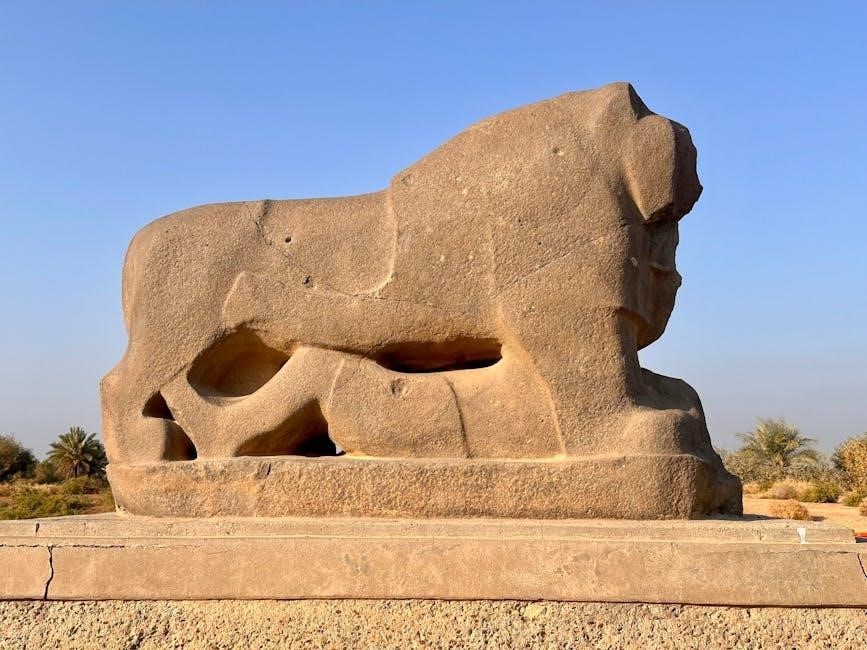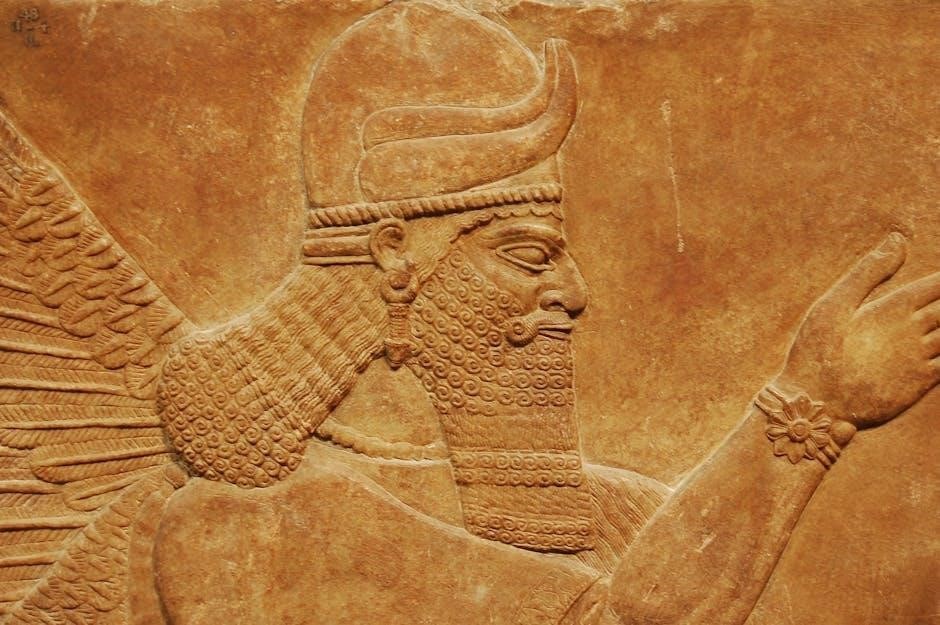
from babylon to timbuktu pdf
This book, authored by Rudolph R. Windsor, explores the history of ancient Black races, including Black Hebrews, tracing their journey from Babylon to Timbuktu.
Available in PDF and audio formats, it offers a detailed historical account, making it a valuable resource for understanding African and Middle Eastern heritage.
Overview of the Book
From Babylon to Timbuktu: A History of the Ancient Black Races Including the Black Hebrews, authored by Rudolph R. Windsor, is a meticulously researched historical text that delves into the origins and migrations of ancient Black civilizations. The book spans regions such as Mesopotamia, Egypt, and Africa, highlighting the cultural and intellectual contributions of Black peoples. It traces the journey of the Black Hebrews, exploring their historical significance and legacy. Available in both PDF and audio formats, the book is designed to be accessible while maintaining academic rigor. Windsor’s work challenges conventional narratives, offering a detailed and engaging exploration of often-overlooked historical accounts. The text is enriched with sources for further study, making it a valuable resource for scholars and general readers alike. Its focus on cultural exchange and societal evolution provides a comprehensive understanding of ancient Black heritage.
Importance of the Topic
The topic of From Babylon to Timbuktu holds significant importance as it uncovers the often-overlooked history of ancient Black civilizations and their contributions to global culture. By tracing the journey of Black races from Mesopotamia to Africa, the book challenges Eurocentric narratives and sheds light on the intellectual and societal advancements of Black societies. This exploration is crucial for understanding the roots of globalization and cultural exchange. The book’s focus on Black Hebrews and their heritage fills a gap in historical literature, providing a more inclusive perspective on world history. Its availability in PDF and audio formats ensures accessibility, making it a vital resource for education and fostering a deeper appreciation of African and Middle Eastern heritage. The topic’s relevance lies in its ability to reshape historical understanding and promote inclusivity in academic and popular discourse.
The Author: Rudolph R. Windsor
Rudolph R. Windsor is a historian and author known for his meticulous research on ancient Black civilizations, offering unique insights into their cultural and historical significance.
Background and Contributions
Rudolph R. Windsor is a renowned historian and author dedicated to uncovering the histories of ancient Black civilizations. His work challenges Eurocentric narratives, emphasizing the contributions of Black cultures to global development. Windsor’s research spans Mesopotamia, Egypt, and Africa, highlighting the interconnectedness of these regions. He has lectured at universities, appeared on radio and TV, and redesigned his first book to enhance its accessibility. His writing bridges academia and popular reading, making complex histories engaging for a broad audience. Windsor’s contributions include shedding light on the Black Hebrews’ heritage and their role in shaping civilizations. His work is available in PDF and audio formats, ensuring widespread accessibility and fostering a deeper understanding of African and Middle Eastern histories.
Other Works and Lectures
Beyond “From Babylon to Timbuktu,” Rudolph R. Windsor has contributed significantly to historical discourse through various lectures and media appearances. He has spoken at universities, congregations, and organizations, sharing insights into Black history and culture. Windsor’s work has inspired cultural projects, including an album by Timbo King, which draws from his book’s themes. Additionally, his research has been adapted into audiobooks, making his scholarship accessible to a wider audience. Windsor’s engagements on radio and TV talk shows further highlight his commitment to spreading knowledge about ancient Black civilizations and their global impact. His multifaceted approach ensures that his work resonates across different platforms and generations.

Historical Context of the Book
The book traces the historical journey of ancient Black races from Babylon to Timbuktu, highlighting their cultural and societal contributions to early civilizations in Mesopotamia and Africa.
Ancient Civilizations: Babylon and Beyond
The book delves into the origins of ancient civilizations, beginning with Babylon, a cradle of human culture and law. It highlights the contributions of Black races in shaping early societies, from Mesopotamia to Egypt and Kush. These civilizations laid the groundwork for advancements in writing, governance, and architecture. The text emphasizes how these early societies influenced global development, challenging Eurocentric narratives. By tracing the spread of Black influence across ancient regions, the book provides a comprehensive understanding of their role in shaping human history. This section underscores the richness and depth of these civilizations, offering insights into their cultural, scientific, and political achievements.
The Role of Timbuktu in African History
Timbuktu emerges as a pivotal hub in African history, renowned for its intellectual and cultural significance. As a crossroads of trade and knowledge, it connected West Africa with Mediterranean and Middle Eastern regions. The city flourished during the Mali and Songhai empires, becoming a center for Islamic scholarship and manuscript preservation. Its iconic universities and libraries housed vast collections of texts on law, medicine, and astronomy. Timbuktu’s role in preserving and disseminating knowledge underscores its importance in African and global history. The book highlights how this legacy continues to inspire contemporary discussions on African contributions to education and culture, showcasing Timbuktu as a symbol of intellectual excellence and cultural exchange.
Black Hebrews and Their Heritage
The book delves into the rich history of the Black Hebrews, tracing their origins and migrations from ancient Babylon to various regions of Africa. It explores their cultural practices, traditions, and contributions to early civilizations, offering a detailed account of their heritage. The Black Hebrews’ journey through Egypt, Ethiopia, and beyond is highlighted, showcasing their enduring impact on global history. Windsor’s work emphasizes the often-overlooked role of Black Hebrews in shaping societies, from religious practices to intellectual advancements. By examining their legacy, the book bridges gaps in historical narratives, providing a comprehensive understanding of their significance in the ancient world and their lasting influence on modern cultures.
Key Themes Explored in the Book
The book explores cultural exchange, Black Hebrew heritage, and historical linguistics, tracing connections between ancient civilizations and their enduring legacies in global history and culture.
Cultural Exchange and Globalization
The book emphasizes the extensive cultural exchange networks that connected ancient Mesopotamia, Africa, and other regions. Windsor highlights how these interactions shaped global civilizations, emphasizing the flow of ideas, goods, and knowledge across vast distances. The trans-Saharan trade and intellectual exchanges between Babylon and Timbuktu are key examples. These connections not only facilitated economic growth but also enriched societal evolution and artistic diffusion. By examining these historical links, the book underscores the role of globalization in fostering cultural diversity and understanding. It challenges Eurocentric narratives by showcasing Africa’s central role in early global networks, thereby redefining perceptions of history and cultural influence.
Black Contributions to Early Civilizations
Rudolph R. Windsor’s work meticulously documents the significant contributions of Black populations to early civilizations. From the technological advancements in Mesopotamia to the cultural and intellectual achievements in Egypt and Kush, the book reveals how Black societies laid the groundwork for human progress. These contributions encompassed agriculture, architecture, and governance, shaping the foundation of modern society. Windsor argues that these civilizations thrived during periods when Europe was less developed, challenging conventional historical narratives. By highlighting Black excellence in these regions, the book provides a more inclusive understanding of global history, emphasizing the enduring legacy of African and Black Hebrew communities in shaping human civilization.
Historical Linguistics and Manuscript Culture
From Babylon to Timbuktu delves into the evolution of languages and manuscript traditions, showcasing how Black cultures preserved and disseminated knowledge. The book examines ancient texts, revealing linguistic ties between Mesopotamia, Africa, and the Mediterranean. Windsor highlights the scribal practices of Black Hebrews, emphasizing their role in maintaining historical records. The manuscript culture of Timbuktu, with its vast libraries, is explored as a hub of intellectual exchange. This section underscores the importance of written records in understanding the past, illustrating how textual transmission shaped cultural and historical narratives across civilizations. Windsor’s analysis bridges gaps in historical linguistics, offering insights into the diffusion of knowledge and the enduring impact of African scholarship.

Reception and Impact of the Book
The book has had a significant impact, sparking discussions on Black history and culture. Its PDF version and digital formats have widened its academic and popular reach.
Academic and Popular Reception
From Babylon to Timbuktu has garnered both academic and popular acclaim for its meticulously researched content and insightful exploration of Black history.
Scholars praise its detailed analysis of ancient civilizations and the Black Hebrews, while the general public appreciates its accessible writing style.
The book’s availability in PDF and audio formats has further expanded its reach, making it a valuable resource for both serious researchers and casual readers.
Its impact lies in bridging the gap between academic rigor and popular interest, fostering a deeper understanding of African and Middle Eastern heritage.

Influence on Contemporary Discussions
From Babylon to Timbuktu has significantly influenced modern conversations about race, history, and cultural identity, challenging Eurocentric narratives and highlighting African contributions.
Its exploration of Black Hebrews and ancient civilizations has inspired new perspectives in fields like historical linguistics and manuscript culture.
The book’s emphasis on cultural exchange and globalization resonates with contemporary debates on diversity and inclusivity;
By shedding light on overlooked histories, it has become a cornerstone in discussions about Black heritage and its global impact, fostering a more inclusive understanding of human civilization.
Accessibility and Modern Formats
The book is widely available in PDF format, ensuring easy digital access for modern readers. Its downloadable version has made it accessible across various platforms.
The PDF Version and Digital Availability

The PDF version of From Babylon to Timbuktu is widely accessible, enabling readers to engage with the text on various digital platforms. Its availability online ensures global reach, making it a convenient option for scholars and enthusiasts alike.
Digital formats have enhanced the book’s accessibility, allowing readers to download and study it effortlessly. The PDF version is compatible with multiple devices, fostering a seamless reading experience and promoting widespread dissemination of its historical insights.
Audio Versions and Multimedia Adaptations
The audio version of From Babylon to Timbuktu offers an engaging listening experience, narrated to bring the historical narrative to life. This format caters to auditory learners and busy individuals who prefer on-the-go access to the content.
Multimedia adaptations, including video discussions and podcasts, further enhance the book’s accessibility. These adaptations provide a dynamic way to explore the themes and historical details, appealing to a broader audience and fostering deeper engagement with the material.